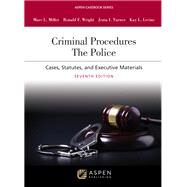Criminal Procedures: The Police: Cases, Statutes, and Executive Materials
, by Miller, Marc L.; Wright, Ronald F.; Turner, Jenia I.; Levine, Kay L.- ISBN: 9781543859126 | 1543859127
- Cover: Package w/ Access Code
- Copyright: 2/6/2023
Buy a new version of this textbook and receive access to the Connected eBook with Study Center on Casebook Connect, including lifetime access to the online ebook with highlight, annotation, and search capabilities. Access also includes practice questions, an outline tool, and other helpful resources. Connected eBooks provide what you need most to be successful in your law school classes.
Criminal Procedures: The Police, by Marc Miller, Ronald Wright, Jenia Turner, and Kay Levine, focuses on the interactions among multiple institutions in shaping the law of Criminal Procedure, bringing state courts, legislatures, prosecutor offices, and police department policymakers into the picture alongside the U.S. Supreme Court.
Buy a new version of this textbook and receive access to the Connected eBook with Study Center on CasebookConnect, including: lifetime access to the online ebook with highlight, annotation, and search capabilities; practice questions from your favorite study aids; an outline tool and other helpful resources. Connected eBooks provide what you need most to be successful in your law school classes.
Criminal Procedures: The Police: Cases, Statutes, and Executive Materials, Seventh Edition, is a comprehensive treatment of criminal procedure that depicts the enormous variety within criminal justice systems by examining the procedures and policies of both federal and state systems and looking at sources of law and doctrine from multiple institutions. This “real-world” text offers students and instructors a deliberate focus on the realities of the high-volume circumstances that surround criminal procedure. The currency and timeliness of the Seventh Edition of this highly regarded casebook are ensured by an updated selection of cases and statutes as well as expanded coverage of important areas. This time- and classroom-tested casebook: Surveys the constitutional, statutory, and administrative doctrines and practices that shape how the police interact with citizens and investigate crimes; examines the procedures and policies of both federal and state systems, as well as the assumptions and judgments underlying each, and how these systems interrelate and sometimes compete with one another; looks at sources of law and doctrine from multiple institutions, including U.S. Supreme Court cases, state high court cases, statutes, rules of procedure, and police and prosecutorial policies; explores the influence of politics within various institutions of law enforcement and the role of public pressure on policing and procedure with regard to terrorism, drug trafficking, domestic abuse, and the treatment of crime victims; compares U.S. practices with the criminal investigations that happen in other countries; investigates the impact of criminal procedures on law enforcers, lawyers, courts, communities, defendants, and victims through the use of interdisciplinary materials.
New to the 7th Edition:
- New organization for the search and seizure chapters to better reflect long-term doctrinal changes.
- Coverage of new design options for police organizations, inspired by the “Defund the Police” movement.
- Spotlighting the Breonna Taylor tragedy in Louisville as a focal point for discussion of no-knock warrants.
- Emphasis throughout the search and seizure chapters on the interaction between technology and doctrinal change.
Professors and students will benefit from:
- Materials that support class discussion, including criminal court actors beyond the Justices of the U.S. Supreme Court: the vision is “street-level federalism.&rdquo
- Materials that portray for students the range of current practices in criminal justice rather than a rushed historical narrative about doctrinal trends.
- Supporting website that offers exemplar documents from legal practice, recent news with relevance for criminal procedure, and brief video lectures to introduce each major unit.
- Emphasis on high-volume practical issues in criminal procedure instead of intricate but rarely-encountered questions.
- Intuitive organization (particularly in the search and seizure units) that makes it easy to see connections among different areas of the law.






